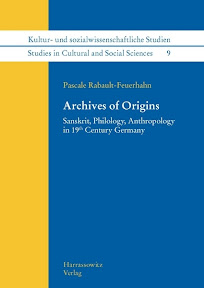Rabault-Feuerhahn: Archives of Origins
Rabault-Feuerhahn, Pascale:
Archives of Origins : Sanskrit, Philology, Anthropology in 19th Century Germany / Pascale Rabault-Feuerhahn. Translated from French by Dominique Bach and Richard Willet. - Wiesbaden : Harrassowitz, 2013. - 336 S. - (Kultur- und sozialwissenschaftliche Studien = Studies in Cultural and Social Sciences ; 9)
Einheitssachtitel: L'archive des origines : Sanskrit, philologie, anthropologie dans l'Allemagne du XIXe siècle <engl.>
ISBN 978-3-447-06871-0
EUR 68,00
DDC: 491.2
-- Angekündigt für April 2013 --
Beschreibung
1784: British administrators create the Asiatic Society of Bengal and start editing Sanskrit texts with the help of Pandits. 1804: Friedrich Schlegel begins studying the Sanskrit manuscripts of the French National Library in Paris. Within twenty years, the study of Sanskrit by Europeans had undergone a profound shift: it was no longer necessary to be in India to tackle the subject; the Germans took over the British, chairs of Indology were included in most German universities and German Indologists were even hired in Great-Britain and in India. From the start in the period of Romanticism, the knowledge of Sanskrit was instrumental in acknowledging the existence of an Indo-European family of languages and laying the basis for comparative grammar. This placed the question of the links between languages and peoples at the heart of Indological research and shed light upon the ambiguous status of India as an Eastern entity whose language tied it to the West. German Indologists engaged in the study of the Vedas, the most ancient and sacred Text of Indian Antiquity, mostly envisaged them as a key to a primeval Indo-European Age.
Pascale Rabault-Feuerhahn retraces the intellectual and institutional history of Indology in 19th century Germany by replacing it within the broader academic, political, and cultural context, and looks at its evolution in the confrontation with the neighbouring disciplines: classical philology, Oriental languages, theology … Contrary to its reputation as a highly specialised discipline, German Indology was concerned with major issues concerning the origins of peoples, languages, mythology and religions. It thus perfectly illustrates the anthropological dimension of philological research. [Verlagsinformation]
Inhalt
Preface by Charles Malamoud. 9
Acknowledgements. 13
Abbreviations. 14
Introduction: India, a German Passion? 15
PART ONE: SANSKRIT AND PHILOLOGICAL TRADITION IN GERMANY. 29
I. A SANSKRIT REVOLUTION? 31
Scientific Discovery: between Rupture and Continuity. 31
From India to Europe, the Formation of Knowledge about Sanskrit. 34
Paris at the Crossroads of European Orientalisms. 42
A Philosophical, Scientific or Romantic Project? 51
II. IS INDOLOGY A FORM OF HUMANISM? 67
Philology, Theology, Orientalism: Intertwined Evolutions. 68
The Implications of Prussian Neo-Humanism. 74
Sanskrit in German Universities. 81
Indology and the Sciences of Antiquity. 84
SECOND PART: THE HEGEMONY OF COMPARATIVISM. 99
III. THE SCHOOL OF GERMAN INDOLOGY. 101
Comparativism as a Token of Legitimacy. 101
The Birth of Vedic Studies. 109
The Spearhead of German Indology. 118
The Archives of the Human Mind. 123
Romantic Resurgences. 128
IV. A SOURCE FOR SCIENCE. 135
Indology and Religion. 136
Liberal Protestantism and the Ethic of Returning to Texts. 143
The Services of Etymology. 148
The Comparative Science of Religion versus the General History of Religions. 157
Dissensions and Convergences around the "German School". 165
THIRD PART: THE CHALLENGES OF ANTHROPOLOGY. 173
V. THE GOOD AND BAD FORTUNES OF INDO-EUROPEAN COMPARATIVISM. 175
The Promotion of the Indo-European Notion at the Time of German National Unity. 175
German Indologists Faced with the Rise of "Aryanist" Theories. 180
Philology, a Natural Science or a Human Science? 194
The Critical Transfer of Comparative Grammar in France. 201
VI. THE STATUS OF INDIA: A QUESTION OF SCALE. 219
"Returning India to the Indians". 220
The Authority of Commentaries. 230
Ancient India Reconsidered. 238
The Lessons of Anthropology. 246
Conclusion. 263
Bibliography. 273
ANNEXES. 295
ANNEX I: Indicative Chronology Germany – United Kingdom – France. 295
ANNEX II: Chairs in Indology in Germany and at German-speaking Universities outside of Germany until 1914. 309
ANNEX III: Main Journals on Indology and Comparative Grammar in Germany in the 19th Century.
Bibliographical Update. 325
Glossary of Terms Relating to Vedism. 329
Index. 331
Autorin
PASCALE RABAULT-FEUERHAHN, wissenschaftliche Mitarbeiterin im Projekt: Pays germaniques - UMR 8547: Transferts culturel, CNRS, Paris. Profilseite.
Quellen: Harrassowitz; Deutsche Nationalbibliothek; Buchhandel.de; Lehmanns Media
Bildquelle: Harrassowitz Verlag, Wiesbaden
Bibliographie: [1]
References
- (2013). Archives of Origins: Sanskrit, Philology, Anthropology in 19th Century Germany. Kultur- und sozialwissenschaftliche Studien = Studies in Cultural and Social Sciences; 9. 336 S.

